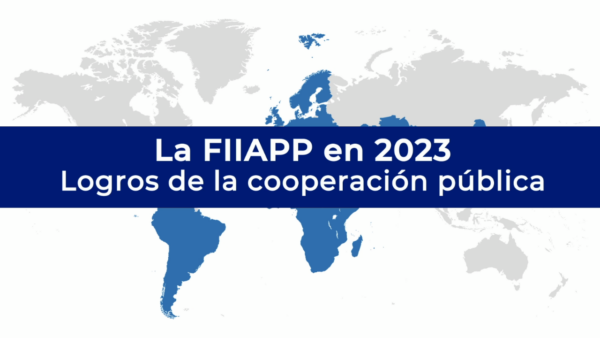-
27 December 2023
Category : Sin categorizar
Public cooperation achievements in 2023
As we take stock at the end of the year, we have chosen some of the most significant achievements of 2023. We continue to work towards stronger public systems for people and the planet

In the last days of December we tend to look back on all that we have achieved during the year. It is a time for reflection, but it is also a time for new resolutions and dreams. At FIIAPP we are well aware of this and our drive to continue building and improving public systems for people and the planet does not cease. Moreover, this year has been very special because we have completed 25 years of cooperation, sharing knowledge and experiences in more than 120 countries.
There are many achievements and they do not fit in a post of X or in a video. Not even in this blog. However, these 34 achievements are a sample of the tireless and enthusiastic work of our public sector professionals in cooperation.
With the firm conviction that public policies can and must improve people’s lives, they are committed to working with FIIAPP on a wide range of issues: justice, peace, development, environment, security, social policies, rights, digitalisation…
Our public administrations are full of talent and commitment.
These achievements are yours, they are ours.
Digitalisation
Ukraine: new IT curriculum for early childhood, primary and secondary education to prepare 4 million students for a post-conflict digital future.
Somalia, Kenya and Djibouti: civil service training for the digital transformation of the administration.
Latin America and the Caribbean: Latin America and the European Union strengthen their Digital Alliance to ensure data protection and digital rights in both regions.
Paraguay: strengthening statistical capacity by integrating information on health, civil registry and migration, among others.
Green agenda
Latin America and the Caribbean: accompanying decarbonisation strategies and strengthening the capacities of climate services.
Cuba: updating energy policy by orienting it towards green energy (thermal districts, climate finance and agro-ecological value chains).
Guatemala and Dominican Republic: support for circular economy strategies and strengthening forest fire management.
Amazonia: launch of the Amazonian Network for Integrated Fire Management (RAMIF).
Lebanon: creation of the “Green Police” app for reporting environmental crimes.
Justice
Dominican Republic: positioned as a benchmark in the digitisation of justice in the Caribbean.
MERCOSUR: creation of an international protection order for victims of gender-based violence.
Peru and Bolivia: strengthening the capacities of police and justice institutions to curb organised crime by creating joint security and justice investigation teams.
Trade
Uruguay: support for sustainable certifications to guarantee exports in line with the EU regulation on deforestation.
Continental Africa: creation of a free trade area with a focus on young people, making the tools and opportunities offered by this treaty available to them.
Youth
Tunisia: development of municipal programmes on youth and sport.
Morocco: implementation of the youth card and support for a future youth law in the country.
Fight against terrorism and organised crime
Sahel: creation of 13 rapid action groups to ensure security in areas at high risk of organised crime. This presence has enabled the reopening of markets, schools and health centres.
Senegal, Ghana and Kenya: 300 security officers trained to protect public spaces from potential terrorist attacks.
Lebanon: publication of the first report on the state of human rights in the country, with the support of our project Community Policing.
Migrations
8 African countries: Training in European legislation on regular migration for public officials responsible for migration management, civil society organisations and European embassies. In addition, we have developed e-learning platforms for European and African civil servants responsible for migration management and for civil society organisations.
Border management
Latin America and the Caribbean: creation of the Athens Network in 6 countries in the region to exchange information and control document fraud.
Colombia and Ecuador: implementation of the “One Stop Control” system to speed up the passage of people.
MERCOSUR and the Andean Community: implementation of border regulations and information exchange mechanisms to stop organised crime. Creation of a border management diploma course for officials from six pilot borders.
Fight against trafficking
Nigeria: creation of a national database for the investigation of trafficking networks and the protection of victims.
Dominican Republic, Haiti and Jamaica: equipping Interpol offices with state-of-the-art technology to provide a network for information and investigation of human trafficking and smuggling crimes.
Local government
Angola: implementation of participatory governance mechanisms, open governments and citizen laboratories.
Mexico: development of a fiscal model for social cohesion, strengthening revenue collection and the quality and transparency of spending.
Drugs
Latin America and the Caribbean: reinforcement of drug observatories and institutional coordination against the laundering of assets derived from drug trafficking.
Chile: new approaches to drug policies such as socio-labour for young people with drug problems or mental health monitoring in juvenile homes.
Central Asia: implementation of treatment and care aimed at the specific needs of women with drug use problems, both in the community and in prisons.
Public Expertise
Spanish cooperation: public technical cooperation is included in Spain in the new Law on Cooperation for Sustainable Development and Global Solidarity. This year we have mobilised more than 620 public professionals from more than 180 European institutions.
25th anniversary: we celebrate our 25th anniversary consolidating the commitment to cooperation of Spanish Public Talent. We also commemorated the 25th anniversary of the twinning programme, led in Spain by the FIIAPP.
European cooperation: we have managed to get the European Public Service Ministries to share a roadmap with the Ministries of Foreign Affairs and Cooperation. Objective: to position public sector international cooperation as a driver of development.
The views and opinions expressed in this blog are the sole responsibility of the person who write them.




